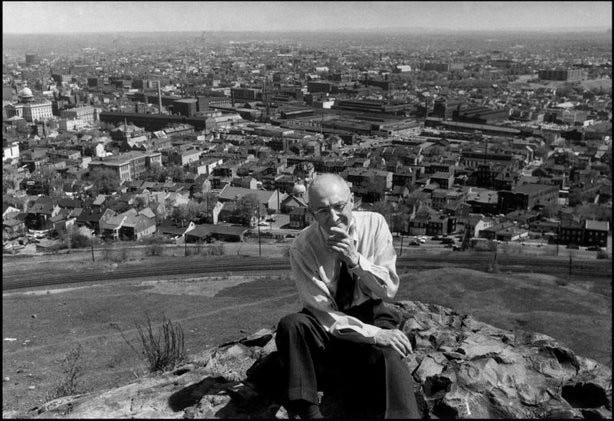4TH OF JULY ------------------ WILLIAM CARLOS WILLIAMS I. The ship moves but its smoke moves with the wind faster than the ship -thick coils of it through leafy trees pressing upon the river. II. The heat makes this place of the woods a room in which two robins pain crying distractedly over the plight of their unhappy young III During the explosions at dawn, the celebrations I could hear a native cuckoo in the distance as at dusk, before I’d heard a nighthawk calling STUFF TO THINK ABOUT: 1. What is a device that Williams uses in this poem that is normally used in fiction and/or storytelling? 2. What can we infer about the presence of birds in this piece, particularly the nighthawk? 3. What can be inferred by the presence of the ship? William Carlos Williams was born the first of two sons of an English father and a Puerto Rican mother of French, Dutch, Spanish, and Jewish ancestry, and he grew up in Rutherford, New Jersey. He was a medical doctor, poet, novelist, essayist, and playwright. With Ezra Pound and H.D., Williams was a leading poet of the Imagist movement and often wrote of American subjects and themes. Though his career was initially overshadowed by other poets, he became an inspiration to the Beat generation in the 1950s and 60s. He was known as an experimenter, an innovator, a revolutionary figure in American poetry. Yet in comparison to artists of his own time who sought a new environment for creativity as expatriates in Europe, Williams lived a remarkably conventional life. A doctor for more than 40 years serving the citizens of Rutherford, he relied on his patients, the America around him, and his own ebullient imagination to create a distinctively American verse. Often domestic in focus and "remarkable for its empathy, sympathy, its muscular and emotional identification with its subjects," Williams's poetry is also characteristically honest: "There is no optimistic blindness in Williams," wrote Randall Jarrell, "though there is a fresh gaiety, a stubborn or invincible joyousness." "Asphodel" was among several of Williams's highly esteemed later works. Prior to his 1952 stroke he had been under a taxing three-book contract at Random House, a contract he fulfilled with The Build Up, Autobiography, and Make Light of It. The hurried writing of the Autobiography, evidenced by its many factual mistakes, as well as the worry over the Library of Congress debacle, have both been cited as contributing factors in his declining health. But Williams's weakened physical powers, apparently, strengthened his creative ones. "I think he did much better work after the stroke slowed him down," reflected Flossie. Stanley Koehler agreed. The Desert Music and Journey to Love, he said, "were written in an unusual period of recovery of creative power after Dr. Williams's first serious illness in 1952." Aside from featuring the variable foot and such outstanding poems as "Asphodel," these two books impressed readers as the mature work of a poet very much in control of his life and craft. Reviewing Desert Music, Kenneth Rexroth called the title poem "an explicit statement of the irreducible humaneness of the human being." The book's ideas are "simple, indisputable, presented with calm maturity," continued Rexroth. "I prophesy that from now on, as Williams grows older, he will rise as far above his contemporaries as Yeats did in his later years." The love poems of Journey to Love were no less impressive to Babette Deutsch. "The poet gives us vignettes of the daily scene, notations on the arts, affirmations of a faith no less sublime for being secular, in the language, the rhythms, that he has made his own," reported Deutsch. "The pages bear the indelible signature of his honesty, his compassion, his courage." Finally, to highlight a decade of productivity, Williams's last book, Pictures From Brueghel, won a Pulitzer Prize in 1963. Despite his failing health, Williams lived as productively as possible throughout his later years. He traveled, gave lectures, and entertained writers in the same home that had been visited by members of the Imagist movement more than 40 years earlier. Williams wrote, too—poetry, of course, as well as essays and short stories. He continued to cooperate with writers interested in him and his work. No longer able to read, by the end of the decade he depended on Floss to read to him, often as long as four hours a day. A particularly painful view of the aging Williams appeared in his 1962 interview with Stanley Koehler for the Paris Review. "The effort it took the poet to find and pronounce words can hardly be indicated here," reported Koehler. Continued failing health further slowed Williams until, on March 4, 1963, he died in his sleep. SUGGESTED WRITING PROMPTS Write about an Independence Day memory you have to the best of your recollection. Write about the trauma you or others might experience around the explosions so prevalent during the holiday. Tell us why you hate or love Independence Day. If you hate Independence Day, tell us about a holiday you love. Creative Resistance/Non-compliance.
Discussion about this post
No posts



